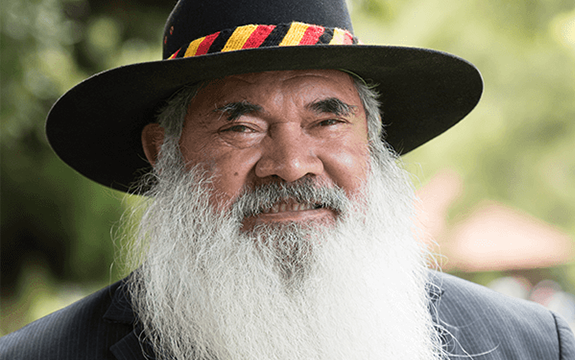Reflecting on reconciliation with Senator Pat Dodson

In Summary
- Senator Pat Dodson joined Swinburne’s Moondani Toombadool Centre team for the annual Reconciliation Lecture
- Racism, deaths in custody, Treaty and moving on from fear were covered in the wide-ranging conversation
- As an elevate RAP organisation, Swinburne creates opportunities to come together and discuss topical issues as a community
Finding common ground among the Black Lives Matter protesters and those affected by COVID-19 could lead to a healthier discussion, said Yawuru man Senator Pat Dodson, speaking at Swinburne’s 2020 Annual Reconciliation Lecture.
In conversation with Swinburne’s Executive Director of Reconciliation Strategy and Leadership, Professor Andrew Gunstone, Senator Dodson explained how reconciliation is about bringing disparate groups together to find solutions.
“Reconciliation is trying to find the common ground. In terms of the current protests and the coronavirus, that common ground is ‘I can’t breathe’. If you focus on the common elements that affect us then, I think it would be a far healthier discussion rather than condemning the people that are protesting,” says Senator Dodson.
“People in positions of power and privilege, need to find common ground with First Nations peoples and go down these roads of treaty making and agreement making.”
Regarding the 1991 Royal Commission into Aboriginal Deaths in Custody, of which Senator Dodson was a commissioner of the report, Senator Dodson says it was a chance to find real solutions.
“It was an opportunity for some very good minds to focus in on how to find solutions, ... How structurally policing and criminal justice could be transformed for the police and for First Nations people,” he says.
Senator Dodson reinforced how important duty of care is in relation to deaths in custody.
“People who have the custody of another person have a higher duty of care to look after that person, as they are completely at the mercy of the authority.”
Specifically addressing medical care of those in custody, Senator Dodson said that police officers often aren’t trained in that space and should refer to professionals when they are unsure.
“Coppers have to take the attitude and position that if someone looks sick, they must take them to a hospital or a clinic so they can get the help they need. There should be an onus on health professionals to then hold people for at least 24 hours to make sure they’re okay. Treat people from a health perspective first, rather than treating them as some terrorist or criminal.”
Senator Dodson discussed fear as an impediment towards reconciliation and his hopes for a more respectful and egalitarian future.
“We need to own up to the history, commemorate it and try to find common ground to celebrate it and then to move on,” says Senator Dodson.
“There’s got to be a Voice to the Parliament one way or another. We’ve seen that quite clearly in recent days: without a formal interface the governments are lost, they don’t know how to deal with us and they don’t know where to go.”
“Australians aren’t silly. They’ve been confronted with the ‘darkest deeds of the past’… There is guilt but also a sense that they’ve achieved a privileged position and they get frightened when they see that privileged position potentially being changed. That’s the fear they’ve got to come over. First Nations people are not trying to remove that privilege from [white Australians], but to get some equity in the privileges we all should be enjoying”
“Australians must understand their own philosophies of equity and honour and mateship and live up to those. And that has to fly across the board. Fear should be the failure to create a united nation within our nation: one that has moved its goalposts a bit to accommodate the First Nations’ aspirations.”
Professor Gunstone said that Senator Dodson provided a powerful and inspiring address.
“One of the most important elements of Senator Dodson’s address was that his analysis of key Indigenous issues over the past forty years clearly illustrates the critical importance of Indigenous self-determination, rights and knowledges, in addressing these issues”, said Professor Gunstone.
View the full discussion, including opening remarks from Swinburne Vice-Chancellor and President Professor Linda Kristjanson AO.
About reconciliation at Swinburne
Swinburne has a strong commitment to Aboriginal and Torres Strait Islander matters and to reconciliation. In 2017, we were the first Australian university to achieve Elevate status for our 2017-2019 Reconciliation Action Plan (RAP). The Swinburne Annual Reconciliation Lecture is a key feature of our RAP, bringing community together to simplify Indigenous voices and knowledges.
In 2018 we established the Moondani Toombadool Centre, responsible for all Aboriginal and Torres Strait Islander matters and reconciliation at Swinburne. The Centre also publishes the Journal of Australian Indigenous Issues, a leading international journal on Indigenous Affairs.

